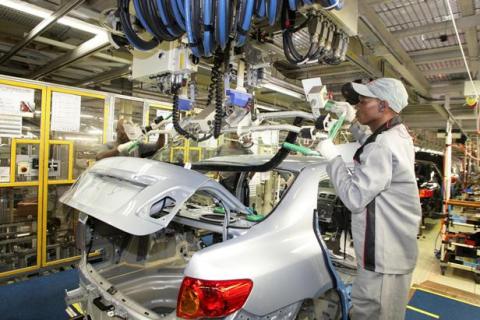South Africa has maintained its dominance in sub-Saharan Africa’s vehicles production, with a growing automotive manufacturers market presence, according to Fitch Solutions.
South Africa now has an overall score of 55.7, up from 52.6 previously, which outperforms the global (50.0) and regional averages (38.4) based on Fitch’s vehicle’s production indicator. This performance is aided by its strong automotive industry policy and favourable competitive landscape, reflected in its scores of 81.3 and 85.7 respectively.
However, these are without risks as the country’s overall score may remain limited as a result. “Long and short-term economic risks remain high in South Africa and will continue to create uncertainty for investment sentiment in the automotive industry,” Fitch Solutions said.
Rising demand from SSA countries amid the ratification of a continent-wide free trade area create export opportunities for original equipment manufacturers (OEMs).
However, on a regional scale, South Africa significantly underperforms under the ‘average wages/labour costs’ category with a score of 30.4 out of a possible 100, whereas the SSA regional average score comes in at 46.4.
This indicates that the labour force in South Africa bears higher costs on a regional scale due to the power of unions in the country, and the costs associated with bureaucratic procedures.
Nigeria Takes Second Spot
Meanwhile, Nigeria took the second spot, surpassing Kenya which moved to the third place with a sizable difference in overall scores between the two countries.
Nigeria’s large driving-age population remains a key appeal for further investment into the country, however high risks associated with the Nigerian market has often dented the country’s appeal. An overreliance on the sector leaves Nigeria vulnerable to international oil price swings, often resulting in foreign currency shortages.
Low wage costs and a highly competitive landscape consisting of a fairly large amount of players in the market gives the country an edge over Kenya, Fitch said.
“Rewards in Nigeria remain high (60.0) given the potential size of the domestic market, though a score of 17.2 on our Risks component highlights the challenging operational and economic conditions for would-be investors.”
Fitch Solutions
On the other hand, Kenya’s well balanced risk/reward profile- Risks (33.5) and Rewards (35.0)- scores is aided by an attractive combination of favourably low-cost and abundant labour, in addition to a conducive industry policy.
This has enticed original equipment OEMs to set up assembly facilities in Kenya over recent years, often partnering with smaller local businesses to lower risks associated with operating local vehicle assembly facilities, Fitch said.
High Risks Continue to Dampen Investor Appetite
The SSA region’s high-risk profile continues to deter investment into automotive production as an unfavorable economic and political risk outlook limits potential investment. Long-term political risks remain high in the region, with SSA scoring 14.1 under the ‘Long-Term Political Risks’ indicator.
The region’s long-term political risk outlook inhibits investments into the region’s automotive industry. This is because automakers and component manufacturers generally prefer a stable political risk outlook for investments that are long term in nature.
The region also underperforms the global average (50.0), under Fitch’s Long-Term Economic Risks Indicator with a score of 19.6, which indicates a volatile economic outlook. The region’s economies are highly dependent on commodity exports for foreign exchange earnings and economic growth.
High economic risks in the form of currency depreciation (leading to higher input costs and foreign currency shortages) leaves companies at risk of an inability to extract profits.
In Nigeria, for example, declines in international oil prices result in highly volatile economic outcomes and thus limits the appetite for investments into the country’s automotive industry.
Ethiopia comes last on Autos Production RRI with an overall score of 20.5 out of a possible 100. This is due to the elevated risks present in the Ethiopian market, which significantly reduce the attractiveness of its automotive production sector.
Nonetheless, the country’s population growth presents long-term prospects as low vehicle penetration levels offer an unsaturated market with opportunity, Fitch said.
READ ALSO: Ghana to Maintain Spot as Continent’s Top Gold Producer in 2021





















